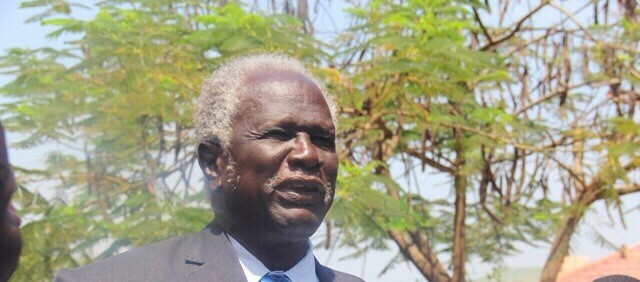The South Sudan National Elections Commission (NEC) boss, Prof Abednego Akok Kacuol, emphasized to Radio Tamazuj in an interview on Tuesday the urgency of proper planning for the General Election. He, in particular, pointed out that his institution could not reduce the budget it presented to parliament because it is reasonable.
Below are edited Excerpts:
Q: What are the priorities of the commission after the postponement of elections to 2026?
A: We have a very clear plan at the commission. We want to establish offices in the states. In Jonglei, Upper Nile and Unity states, the offices need to be built because they were affected by floods. We need to start working and offering training for staff.
Q: Does this mean your budget will only prioritize the establishment of state offices before the end year?
A: Last time the government gave us some money and we can do some repair of state offices, but the main budget has not yet been approved by parliament. Once it is approved, we will be able to complete the things that were still pending.
Q: Some senior officials were saying the budget you presented last year should be reduced. What aspects or budget lines are you planning to reduce?
A: There is a need for political will for the elections. The budget cannot be reduced because it is reasonable. We do not have offices in the states and counties and we do not have vehicles. We need those things to work properly. We also need to train all the staff and make available all the materials for the elections.
Q: Are donors and partners helping the government fund the commission?
A: The UN is helping us with training of staff and we are currently attending a workshop that brought together all chairpersons of the state commissions to Juba. We are yet to see other donors. They are probably waiting for the government to start funding the commission first.
Q: What about financial support from donors?
A: There is no financial support we have received so far from the donors. However, they support through training and the transfer of knowledge and expertise.
Q: After the postponement of elections by two years, are we expecting changes and reshuffles in the commission?
A: I am expecting some changes, especially if the government reaches an agreement with the holdout opposition groups through the Tumaini Initiative in Nairobi.
Q: The people are disappointed by the delay of the elections. Can you assure them that elections will not be postponed again in December 2026?
A: I want to assure the public that elections will not be postponed again in 2026 because there are no other options. Legitimacy of governments are acquired through elections, so there should be hope and the elections must take place. Elections reflect the will of the people, so it cannot be avoided. Extensions cannot last forever because legitimacy is very important for a government to stay in power.
Q: What is the fate of the election law after the postponement to 2026?
A: Well, the law will have to be amended, not changed completely. It has to be explicit in the law that elections will take place in December 2026 and the stipulation that there will be 332 seats in parliament will change to comply with the 2008 population census.
Q: Many people would like to know if Abyei would be part of the elections in 2026. What does the law say about Abyei?
A: Abyei is one of the three administrative areas in South Sudan. Therefore, Abyei will be treated like Ruweng and Pibor and very soon, I will appoint chairpersons of the commissions in those administrative areas. I would like to reaffirm that Abyei will be part of the elections.
Q: What is your final message?
A: I would like to tell the political parties that countries are governed through elections and they should work to ensure that elections take place as planned, because legitimacy and recognition come from people who are the source of sovereignty.




